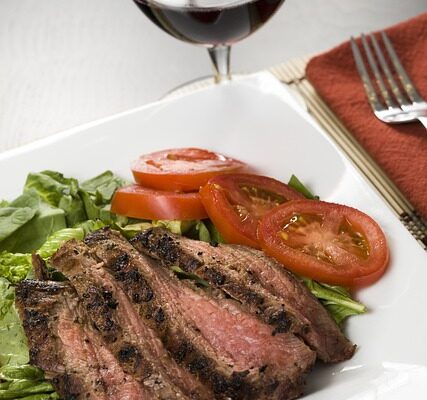A high-protein diet has various advantages.
- You’ll feel fuller for a longer period of time. Protein in your meals and snacks can make you feel full and satisfied, which can aid in portion control.
- You’ll gain and keep more muscular mass. A muscular body works better throughout the day, and muscles burn more calories than fat even when at rest.
- You may be more likely to select nutrient-dense foods. When you design your meals around a lean protein source, you have less room on your plate for less nutritious foods. Also, learning to eat different sources of protein may help you optimize your diet. When you eat tuna, for example, you get not only the protein from the fish but also the healthful fat.
- Weight loss and maintenance may be aided by: When you’re attempting to reduce weight, eating a diet high in lean protein has several advantages. High-protein diets help you gain and maintain muscle mass while also increasing your metabolism and satiety.
- Increases calorie burn: When you eat protein, you also burn a few extra calories because your body needs to work harder to chew and digest the food. This is what we call the thermic effect of food. But keep in mind that the number of extra calories burned is tiny, so you shouldn’t depend on your entire weight loss regimen for this benefit.

The Drawbacks of a High-Protein Diet
A high-protein diet, like any other diet, has possible downsides.
- It is possible to have nutrient deficits. A high-protein diet is frequently deficient in dietary fiber. This can lead to constipation and other health issues. Obtaining enough dietary fiber is vital not only for colon health but also for reducing inflammation and protecting against cancer.
- Foods high in fat and processed are occasionally promoted. Some high-protein diets advise consuming high-fat foods like fatty cuts of beef, full-fat dairy, and processed and cured meats like deli meat, sausage, bacon, and hot dogs. They are not the ideal choices for a balanced diet because they are frequently linked to heart disease and cancer.
- Those with chronic conditions may be at risk if they consume too much protein. Individuals with kidney problems should not eat a high-protein diet unless they consult their doctor first. Excess protein is converted to glucose by the body for use as energy, which may cause a surge in blood sugar levels in diabetics.
- Maybe constraining: Certain high-protein diets drastically restrict carbohydrates, which can lead to nutritional deficiencies and a lack of fiber, leading to constipation and other health issues. Furthermore, a high-protein diet might lead to poor breath.
- Those with renal problems should avoid it: Excess protein is eliminated through the kidneys, which can impair renal function in persons with kidney disease. Moreover, protein metabolism produces nitrogen (ammonia). Nitrogen must be eliminated by the urine. As a result, those on high-protein diets are more likely to become dehydrated and should drink extra water.
- Saturated fats may be present: Whilst most high-protein diets advocate for lean protein sources, others include and even encourage saturated fat-rich protein sources. A high-fat diet can increase your risk of heart disease, and studies have found a link between processed meat consumption and cancer.
Is a High-Protein Diet a Good Option for You?
For weight loss, several experts advocate a low-calorie, high-protein diet. A diet high in lean protein, vegetables, fruits, and whole grains is often regarded as a healthy, balanced strategy to reduce weight.
Dietary guidelines from the United States Department of Agriculture (USDA) advocate a healthy, balanced diet. The USDA Dietary Guidelines for Americans 2020-2025 recommend the following macronutrient percentage breakdown:
- Protein accounts for 10-35% of daily calories.
- Fat accounts for 20-35% of daily calories.
- Carbohydrates account for 45-65% of daily calories.
The recommended daily intake for protein for healthy individuals is 0.8 grams per kilogram of body weight per day, which translates to you should eat slightly under 1 gram of protein for every kilogram of body weight per day at a minimum. If you weigh 200 pounds (91 kilograms), your daily consumption of protein should be at least around. You should consume at least 73 grams.
A high-protein diet that includes fruit, whole grains, lean meats, vegetables, beans & legumes, nuts, seeds, dairy, and healthy oils is recommended. The USDA suggests cutting 500 calories each day to lose weight. It translates to around 1,500 calories per day on a 2,000-calorie diet. However, this number fluctuates depending on age, gender, weight, and activity level. Use this calculator to figure out how many calories you need.

There are several types of high-protein diets, including the Atkins Diet, the Dukan Diet, and the Whole30. Here’s how they stack up:
- The Atkins diet: This diet is a low-carb, high-protein diet that starts with 20 grams of carbs per day, gradually increases to 100 grams per day, and ends with a maintenance phase.
- The Dukan Diet: This diet is a low-carbohydrate, low-fat, and high-protein weight loss program that is founded on the assumption that it is difficult to lose weight while you are hungry and concentrates on lean proteins and fat-free dairy, which increases satiety.
- The Whole30: This diet is a 30-day diet designed as a short-term “reset” of your body (with the goal of reducing cravings and breaking sugar addiction) that removes sugar, alcohol, grains, dairy, and most legumes, leaving only meat, vegetables, and fruit.
To Conclude
The greatest diet for you is one that provides your body with the nutrition and fuel it needs while also being a plan you can stick to. This is a high-protein weight-loss regimen for some. If consuming more protein allows you to eat less during the day while also building a stronger, more active physique, this may be a terrific approach for you.
Note that staying on a long-term or even short-term diet may not be ideal or necessary for you, and many diets, especially long-term diets, simply do not work. While we do not support fad diets or unsustainable weight loss approaches, we do give the facts so that you can make an informed decision that best suits your nutritional needs, genetic blueprint, budget, and goals.
If weight loss is your aim, keep in mind that reducing weight isn’t always synonymous with being your healthiest self, and there are numerous alternative methods to achieve health. Exercise, sleep, and other lifestyle factors all have a significant impact on your overall health. The best diet is one that is well-balanced and fits your lifestyle.
